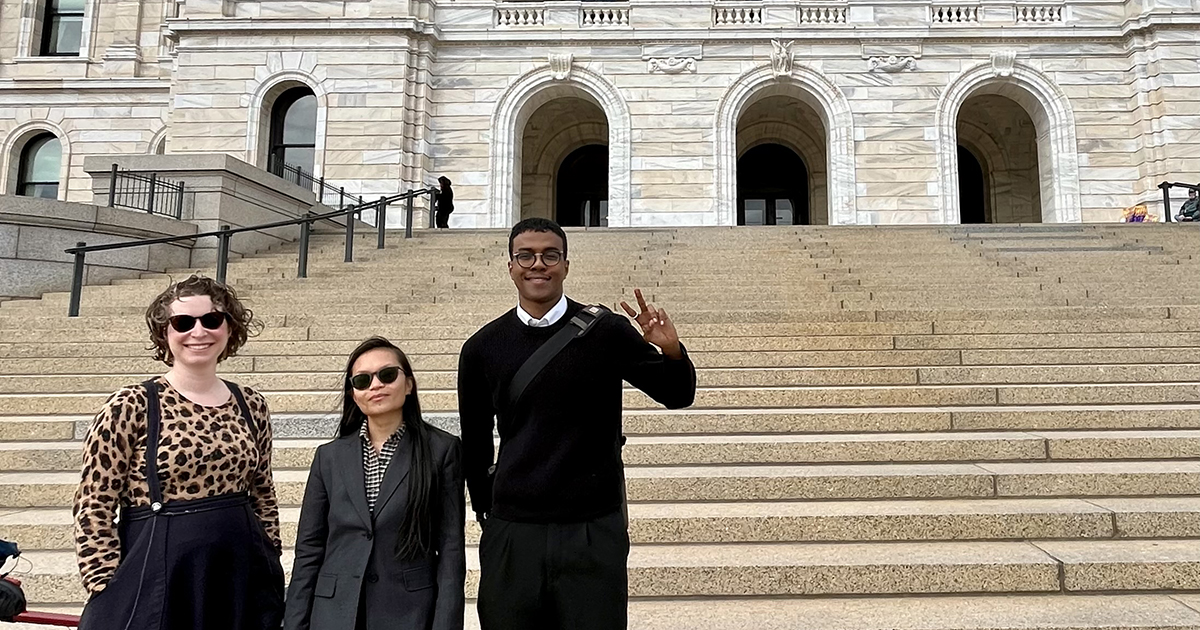Transit Advocates Push Minnesota Lawmakers to Vote Against Bad Transportation Bill
To create a transportation system that works for everyone we know we have to do more than pass policies and secure resources. We have to show up, year after year, to protect our progress and defend our wins. The 2025 state legislative session has illustrated that cycle—and this week we saw on the House and Senate floors how advocacy makes a difference.
As we’ve shared over the past several months, some Minnesota lawmakers came out of the gates looking to claw back our historic wins for public transit funding and curbing climate pollution that passed in 2023 and 2024. From the start of session, Move Minnesota and Move Minnesota Action have been at the State Capitol, meeting with lawmakers and strategizing with allies to push back against a bad transportation bill that takes us backward.
We’ve worked in coalition, securing 15 organizational signatories on a joint letter to House leadership outlining how the House transportation bill “would undermine investments in public transit and active transportation, and delay implementation of climate pollution mitigation from transportation.” And we’ve mobilized and uplifted the voices of outraged Minnesotans who have responded to Move Minnesota Action alerts calling on their state representative to reject a bill that slashes transit investments and delays our groundbreaking Driving Down Emissions law.
On Monday, we saw how that advocacy translates to votes. While all 67 Republican members voted yes on the House transportation bill, 49 of 67 Democratic members voted no, speaking forcefully about the harm this bill will bring to our families, our health, and our economic prosperity in Minnesota.
“Minnesota has the 4th largest road network out of any state in the country despite being 12th in geographic size and 23rd in population. As the saying goes, if you’re in a hole, you should probably stop digging. We need to build smart if we are to be able to maintain what we have,” said Rep. Katie Jones.
“The bill in front of us delays the [Driving Down Emissions greenhouse gas and vehicle miles traveled] law that’s already in effect, which is unfortunate because it’s already causing our engineers and planners to think differently. We need a system that gets people to where they need to go, whether they drive or not. I cannot vote for this bill that removes a crucial tool that will help us have a smarter, more sustainable system from both a financial and environmental perspective,” added Rep. Jones in her closing remarks.
Opposition from 49 state representatives was a powerful rebuke for the funding cuts and policy delays in the House bill and set a strong tone for upcoming negotiations with the Senate. Moving into the final weeks of session, 75 percent of House Democrats made it known that they firmly reject:
- Cutting funding for Metro Transit by $40 million in the 2026-27 budget and $64 million in 2028-29, undermining Metro Transit’s ability to fund and expand the transit system, add personnel to operate and monitor the system for safety, and replace aging fleet and facilities.
- Cutting funding for passenger rail by $8.9 million in 2028-29, limiting MnDOT’s ability to support Borealis service from Saint Paul to Chicago when ridership on the line has exceeded expectations.
- Delaying $16.4 million of funding for the Northern Lights Express from 2028 to 2030, redirecting funds to the highway fund, doubling down on car-centric infrastructure rather than giving Minnesotans more choices in how we get around.
- Cutting funding for active transportation by $4 million in 2026-27 and $8 million in 2028-29, reducing critical resources that save lives and make it easier for people to bike, walk, and roll in their communities.
- Cutting funding for Metro Mobility by $27 million in 2028-29 and free bus rides for Metro Mobility-certified customers by $375,000 in 2026-27 and 2028-29, bringing significant negative impacts for community members who are elderly and have disabilities who are already limited in their transportation options.
- Delaying the implementation of the Driving Down Emissions law by more than three years, prioritizing highway expansion over the health of our climate and communities.
Rep. Larry Kraft, who introduced an amendment that would have prevented the delay in implementation for the Driving Down Emissions law said, “This is systemic change we’re trying to make, to think differently about our transportation system. So we think about how to get people access to the things they need to live their lives versus just thinking about cars.”
“I’m disappointed about the cuts in transit of about $50 million when we have over $100 million of earmarks. I think that’s the wrong priorities,” he added in his closing remarks.
On Thursday, the Senate passed their transportation bill in a 37-28 vote. The Senate version includes similar cuts to public transit, but is a better bill than the House in other ways. The bill includes cutting funding for Metro Transit by $32.5 million in the 2026-27 budget and $32.5 million in 2028-29, which is lower than the House’s funding cuts but still sends the message that it’s acceptable to delay public transit expansion after decades of underinvestment.
Critically, the Senate transportation bill does NOT include delays to the Driving Down Emissions law. It DOES include directing the Met Council to provide grant fund matching to transportation management organizations in the metro area for 2026. It DOES include provisions to update the rigid, outdated definition of “highway purposes” to make it possible to flex state dollars to invest in the healthy, sustainable transportation options that strengthen our communities and reduce pollution.
“Most importantly, I want to thank [Sen. Scott Dibble] for including language to clarify the definition of ‘highway purposes.’ That is language that MnDOT supports because it gives them more flexibility to incorporate transit and active transportation in their projects. And it’ll make it easier for projects to reach their VMT [vehicle miles traveled] goals,” said Sen. Omar Fateh in his closing remarks.
Both the House and Senate transportation bills include a provision to permit MnDOT to receive funds from Metropolitan Council’s regional transportation sales and use tax. As Move Minnesota and Move Minnesota Action executive director, MJ Carpio, testified in a previous Senate transportation committee meeting, “We need to ensure that we protect the intended purposes of the metro-area sales tax that we fought so hard for a couple years ago. One potential solution for this is redefining ‘highway purposes.’ We should give MnDOT the flexibility to spend their own money.”
So what happens next? In May, select members of the Senate and House transportation committees will negotiate and reconcile pieces of their respective bills in conference committee. Leading into the committee, we will continue to make sure our state leaders know we’re counting on them to stay the course we’ve fought so hard to win—and push them to keep building a better future for our families and communities in Minnesota.
We will need your help to protect our transit funding and climate policy wins in the weeks ahead! Stay tuned for more upcoming ways to take action in person and online before the session ends!

